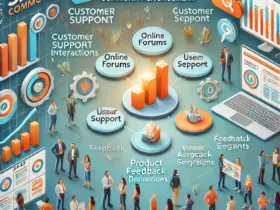In the rapidly evolving landscape of digital marketing, artificial intelligence (AI) is emerging as a game-changer. As businesses strive to understand consumer behavior and predict future trends, AI offers unprecedented opportunities to revolutionize marketing strategies. This article delves into the intersection of AI and marketing, examining current applications and exploring future implications that could redefine the industry.
Current Applications of AI in Marketing
AI is already making waves in marketing through various applications. One of the most prominent uses is in data analysis. AI algorithms can sift through vast amounts of data, identifying patterns and insights that are beyond human capacity. This capability allows marketers to better understand their audience, personalize marketing efforts, and improve customer engagement.
Another significant application is in the realm of content creation. AI-driven tools can generate content suggestions, automate writing processes, and even create entire articles based on input data. This not only saves time but also ensures content remains relevant and engaging for the target audience.
Furthermore, AI is enhancing customer service through chatbots and virtual assistants. These tools can handle routine inquiries, providing instant support and freeing up human agents for more complex tasks. By offering 24/7 service, AI-driven customer support tools enhance customer satisfaction and loyalty.
Future Implications of AI in Marketing
As AI technologies continue to advance, their implications for marketing are vast and transformative. One potential development is the further personalization of marketing efforts. AI could enable hyper-targeted advertising, where campaigns are tailored to individual preferences and behaviors in real time, increasing the effectiveness of marketing spend.
Additionally, AI could revolutionize predictive analytics in marketing. By analyzing historical data and current trends, AI systems could forecast consumer behavior with remarkable accuracy. This capability would allow marketers to anticipate market shifts and adjust their strategies proactively, maintaining a competitive edge.
AI is also poised to enhance the customer experience through advanced personalization. By integrating AI with augmented reality (AR) and virtual reality (VR), marketers could create immersive experiences that captivate consumers. These technologies could be used in virtual showrooms, interactive advertisements, and personalized shopping experiences, setting new standards for customer engagement.

Challenges and Considerations
Despite its potential, the integration of AI in marketing presents several challenges. Privacy concerns are at the forefront, as the use of AI often involves collecting and analyzing vast amounts of personal data. Marketers must navigate regulatory frameworks like GDPR and ensure transparency in how data is used.
Another challenge is the need for continuous learning and adaptation. AI technologies evolve rapidly, requiring marketers to stay updated on the latest advancements and adjust their strategies accordingly. This necessitates ongoing investment in training and development to harness AI’s full potential.
Conclusion
The intersection of AI and marketing is ushering in a new era of possibilities. From enhancing data analysis to revolutionizing customer experiences, AI offers tools that can significantly boost marketing effectiveness. However, these advancements come with challenges that must be addressed to fully realize AI’s potential. Companies like the Huntsville Marketing Group are at the forefront, leveraging AI to drive innovation and deliver exceptional results. As we look to the future, embracing AI’s capabilities while addressing its challenges will be key to staying competitive in the digital marketing landscape.





